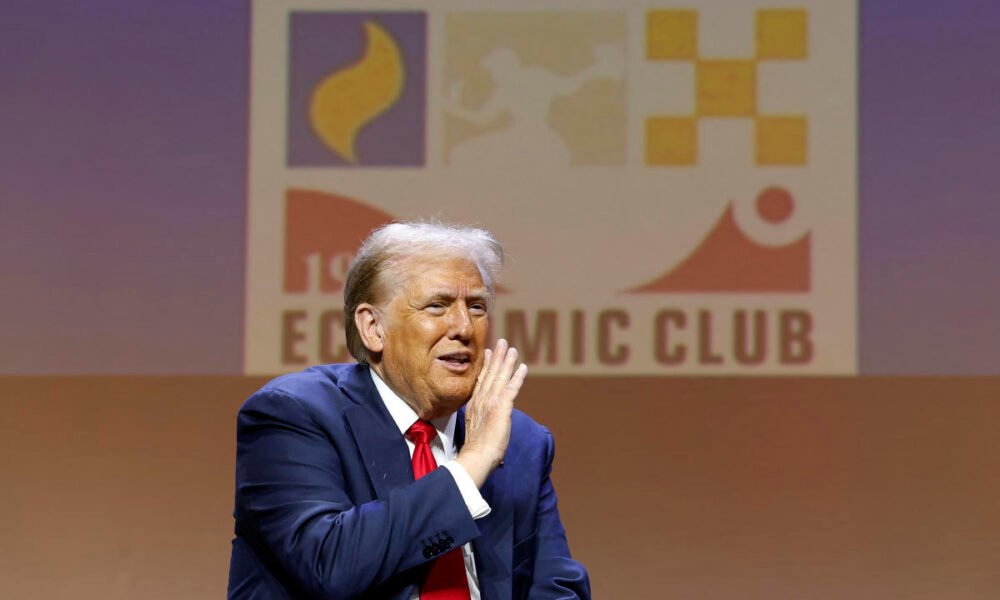Donald Trump and his allies have floated ideas suggesting that Federal Reserve independence could be compromised if the GOP nominee wins, from firing Chairman Jerome Powell to the president having a “say” in setting interest rates.
But even as Trump has tried to distance himself from some of those suggestions, a range of other options remain on the table that could fundamentally change the White House relationship with the central bank if the former president wins.
These range from the notion of a “shadow” Fed chair to ideas laid out in a document known as “Project 2025” to an effort to upend D.C. (and possibly the Fed’s) bureaucracy.
And these options are circulating as Trump renews his critiques of the Fed following a hotter-than-expected inflation reading this past week.
“The fact is that the Federal Reserve brought the interest rates down a little too quickly,” he told the Detroit Economic Club Thursday. “Everyone knows that was a political maneuver that they tried to do before the election,” he added.
The issue has also emerged as a clear dividing line in the 2024 campaign, with Democratic nominee Vice President Kamala Harris saying in August that she disagrees with Trump’s approach and that “the Fed is an independent entity, and as president, I would never interfere in the decisions that the Fed makes.”
The Biden White House has also weighed in on “the importance of an independent central bank.”
Trump downplayed the notion of firing Powell directly, “especially if I thought he was doing the right thing,” and has also partially walked back a previous comment about having “a say” in interest rate decisions.
A notion of a ‘shadow Fed chair’
The idea of a “shadow” Fed chair that emerged this past week came from top Trump economic adviser Scott Bessent, the former Soros Fund Management investing chief (and a possible Trump pick for Treasury Secretary).
He floated the notion in a Barron’s interview that Trump could nominate that “shadow” chair to essentially make Powell a lame duck long before his term ends.
Powell’s full term as a member of the Fed’s board of governors doesn’t end until 2028, but his time atop the Federal Reserve as chair ends sooner, in 2026.
This idea would lay out a post-Powell Fed path even while he’s still in office, and “based on the concept of forward guidance, no one is really going to care what Jerome Powell has to say anymore,” Bessent told the outlet.
Trump has also already promised he wouldn’t nominate Powell to a third term as chair and is already floating possible successors.
Trump hasn’t expressed an opinion on the idea — and a Trump official cautioned that anything not endorsed by Trump himself shouldn’t be deemed as official second-term policy — but Bessent himself is clearly top of mind for Trump, who brings him up often at his rallies.
He called him “one of the top analysts on Wall Street” during the Detroit Economic Club stop this week.
Ideas from Project 2025
The 900+ page “Project 2025” blueprint produced by the conservative Heritage Foundation also posits a series of ideas for the Fed.
They range from changes to how the Fed intervenes in the economy to institutional changes “to take the monetary steering wheel out of the Federal Reserve’s hands and return it to the people.”
Trump has sought to distance himself from the ideas in the book, but it was authored by many of his former aides. The 13-page Federal Reserve chapter was penned by Paul Winfree, who previously served in the Trump White House as deputy assistant for domestic policy.
Many of the ideas Winfree proposes are focused on paring back the Fed’s powers that, according to the book, have overly broadened since the central bank was created in 1913.
It would, for example, abolish the Fed’s “dual mandate,” focusing instead solely on inflation.
Winfree is also critical of the central bank’s ability to influence commercial banks’ capital requirements. It’s a critique that overlaps directly with a raging current debate in Washington around the “Basel III endgame” capital requirements.
The chapter weighs in on another ongoing debate: the Fed’s policy of “quantitative easing,” where the central bank has used purchases of securities to impact the money supply.
The Project 2025 proposal would force a winding down of the Fed’s balance sheet and also limit future purchases.
Winfree’s biggest idea — and perhaps his least politically realistic one — would replace the central bank with more diffuse banks committed to a concept he calls “free banking” — overlooking that the Federal Reserve was created largely in response to the failures of a similarly diffuse system.
Greater control over ‘independent’ federal agencies
A third area where a second Trump White House and the Fed could clash is Trump’s priority of asserting greater control over the federal bureaucracy and independent government agencies like the Federal Trade Commission and Federal Communications Commission.
It’s an effort Trump hasn’t said would include the Fed, but Powell and his colleagues could be in his sights. On his campaign website, Trump promises “a top-to-bottom overhaul of the federal bureaucracies.”
This is an effort to lessen the protections that thousands of government employees have enjoyed from changing political winds. When taking office, presidents typically have around 4,000 so-called “political” appointments to make. But Trump and his allies want to balloon that number to more than 50,000.
Agencies like the Fed and FTC also currently operate at arm’s length from the White House, in a structure the GOP nominee has long critiqued.
“We need to make it much easier to fire rogue bureaucrats who are deliberately undermining democracy,” Trump said back in 2022.
If his proposed reforms are enacted, he added, “Washington will be an entirely different place.”
Ben Werschkul is Washington correspondent for Yahoo Finance.
Read the latest financial and business news from Yahoo Finance








No Comment! Be the first one.